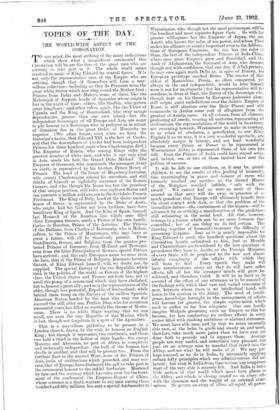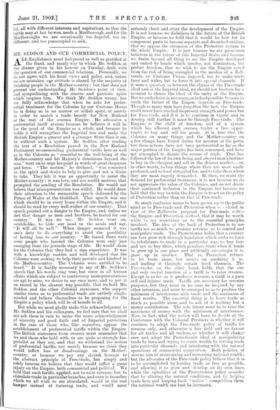TOPICS OF THE DAY.
THE WORLD-WIDE ASPECT OF THE CORONATION.
TO our mind, the most striking of the many indications which show what a magnificent ceremonial this Coronation will be are the lists of the great men who are arriving to take part in it. The whole world seems resolved to make of King Edward its central figure. It is not only the representative men of the Empire who are arriving, though they of themselves will form a mar- vellous collection—including as they do Premiers from the great white States which now ring round the Mother-land ; Princes from India and Malaya, some of them, like the Maharajah of Jeypore, heads of dynasties whose origin is lost in the night of time ; others, like Sindhia, who govern great kingdoms ; and other rulers again, like the Vizier of Uganda and the King of Barotseland, who sway savage dependencies greater than our own island—but the independent Sovereigns of all Europe and Asia are eager to pay honour to a Sovereign who in pedigree as in extent of dominion has in the great Order of Monarchs no superior. (We often forget, even when we have the historian's tastes, that Edward VII. is the heir of Cerdic, and that the descendants of Cerdic had been independent Princes for three hundred years when Charlemagne died.) The Emperor of Russia, who among Kings rules the greatest number of white men, and who is our only rival in Asia, sends his heir, the Grand Duke Michael. The Emperor of Germany, who commands the strongest Army on earth, is represented by his brother, Prince Henry of Prussia. The head of the house of Hapsburg-Lorraine, who counts Charlemagne among his ancestors, and still thinks of himself as rightfully successor of the Roman Caesars, and who, though his house has lost the grandeur of that unique position, still rules over eighteen States and can summon a million sold ers, sends the Archduke Francis Ferdinand. The King of Italy, head of the thrice ancient house of Savoy, is represented by the Duke of Aosta, who might, had his father not been luckless, have been hereditary King of Spain. And the King of Spain, himself , last Monarch of the Bourbon line which once filled three European thrones, sends a Prince of his own family, Carlos de Bourbon, Prince of the Asturias. The Princes of the Balkans, from Charles of Roumania, who is Hohen- zollern, to the Prince of Montenegro, who may have so great a future, will all be vicariously present. From Scandinavia„ Greece, and Belgium, from the greater pro- tected Princes of Germany, from Holland and Portugal, even from the little Principality of Monaco, special Envoys have arrived ; and the only European name we miss from the lists, that of the Prince of Bulgaria, kinsman, however distant, of King Edward himself, will, we doubt not, be supplied. The special Envoys of the two Republics which rank in the politics of the world as Powers of the highest class, the United States and France, are both here, not to swell the pomp of a ceremonial which they have abolished, but to honour a great ally; and so is the representative of the older, though less powerful, Republic of Switzerland; while behind them troop on the Envoys of the endless Spanish- American States, headed by the man who may one day succeed the still abler one, Porfirio Diaz, who for seventeen successful years has filled so worthily the throne of Monte- zuma. There is no white State wanting that we can recall, not even the tiny Republic of San Marino, which is lost, though not forgotten, in a spur of the Apennines.
That is a marvellous gathering to be present in a London church, drawn by the wish to honour an English King ; but though it represents two continents, and those two hold a third in the hollow of their hands—for, except Morocco and Abyssinia, no part of Africa is completely and technically independent—the bulk of the human race dwells in another, and that will be present too. From the furthest East to the nearest West, none of the Princes of Asia, lords of civilisations which preceded, and may sur- vive, that of Europe, have disobeyed the call to take part in the ceremonial honour to the infidel barbarian. Mastered by fate and the courtesy which has rules even for the treat- ment of the condemned, the Empress-Regent of China, whose sentence is a death-warrant to any man among three hundred and fifty millions, has sent a special Ambassador to Westminster, who, though not the most picturesque, will be the loneliest and most separate figure there. So with far greater willingness has the Emperor of Japan, the one Asiatic who knows the value of sea power, and whose Fleet makes his alliance or enmity important even to the delibera- tions of European Emperors. So, too, has the ruler of Siam, the last of the independent Princes of Indo-China, where once great Empires grew and flourished, and the Amir of Afghanistan, the Savoyard of Asia, who dreams, though not with confidence, that one day, if Allah permits, he may once again reach Delhi as, in spite of history, his European prototype reached Rome. The master of that oldest of Monarchies, Persia, so often conquered, yet always in the end independent, would be here himself were it not for an etiquette ; but his representative will far outshine, in dress at least, the Envoy of the Sovereign who, though kept on his throne by European jealousies alone. still reigns amid maledictions over the Asiatic Empire of Rome, is still absolute over the Holy Places, and still commands in Arabia some sort of allegiance from the greatest of Asiatic races. In all colours, from all climates, professing all creeds, wearing all uniforms, representing all civilisations, the representatives of the world in its entirety are swarming towards Westminster to make in courtesy, or as token of obedience, a genuflexion to our King.
Explain it as we may, it is a very wonderful spectacle, one absolutely unique in history, and not least wonderful because every Prince or Power to be represented in Westminster Abbey is represented there of his own free will. Even the Princes of India could have stayed away, and, indeed, one or two of those invited have sent the politest of excuses.
It will be left to our children, or, it may be, grand- children, to see the results of this pooling of humanity, this intermingling in peace and honour of races who formerly touched one another as the Grand Master of the Templars touched infidels, "only with the sword." We cannot feel so sure as most of those around us that envy will die away in presence of so much grandeur, that Europe will ultimately benefit from the closer contact with Asia, or that the problem of the immediate future—the contentment of the masses—will be advanced by so striking a manifestation of the gradations still subsisting in the social level. All that, however, belongs to a future which can be no more foreseen than controlled ; but of one thing we do feel certain. This drawing together of humanity increases the difficulty of governing Empires. Just as it is nearly impossible for King Edward to settle the hundred questions about the Coronation hourly submitted to him, just as Heralds and Chamberlains are bewildered by the new questions of precedence they have to decide, so the Foreign Ministers of every State will be perplexed. by the new and almost infinite complexity of the affairs with which they will have to deal. Every speech they make will have reverberations, every act they do will have reflex effects, till all but the strongest minds will grow be- wildered, and therefore timid. It will be as hard to be assured of the effect of any utterance as to be assured of the feelings with which that vast and varied concourse of men, between whom there is no intellectual bond, will listen to the services in the Abbey. The need of intelli- gence, knowledge, foresight in the management of affairs will become far greater, the simple squire-mind which used to suffice us far less adequate. One can hardly imagine Walpole governing such an Empire as this has become, far less conducting its endless affairs in every corner filled with clashing ambitions or alarmed statesmen. We must have able men, and by that we mean unusually able men, at the helm to guide and steady us, and must, therefore, take much more pains than we have ever yet done both to provide and to support them. Average people are very useful, and. sometimes very pleasant, but just set an average man to marshal that crowd into the Abbey, and see what he will make of it. We may per- haps succeed, as we do in India, by incessantly applying certain lofty principles which our administrators did not invent ; but even in India from time to time any temporary want of the very able is severely felt. And India is but a little section of that world which must have places in the Abbey, and which is closing round us on every side with the closeness and the weight of an external atmo- sphere. To govern an army of allies, all equal, all power- ful, all with different interests and aspirations, so that the battle may at last be won, needs a Marlborough, and for the Marlboroughs we are occasionally too hopeful, too in- different, and. too preoccupied to seek.







































 Previous page
Previous page